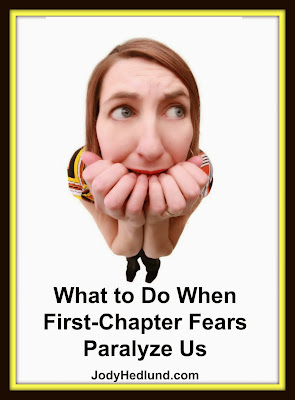By Jody Hedlund, @JodyHedlund
Recently I finished the first draft of a new book of a new series. Not counting the research, the book took me approximately eleven weeks to write.
Usually after I type out the last few words, I expel a deep breath of relief. And then I tell myself the following 6 things:
1. “Thank God for the editing process.”
In fact, thank God for the MANY edits that the book will undergo in the months to come including my own self-editing as well as my publisher’s various levels of editing.
Even though I’ve written over 20 previous books, I wouldn’t ever think about skipping the editing process. I put every single one of my books through the most stringent and vigorous editing process. In fact, I’ve learned to be grateful for the feedback that can make my books better.
2. “Wow. I actually made it to the end.”
As I was writing it, I felt the normal mid-book panic and asked myself questions like: Is the tension strong enough to keep readers' attention? Where is this story taking me? Will I be able to wrap up the plot believably?
I admit. I second-guess myself and my writing ability with almost every book. So I feel satisfied at the end when somehow I manage to land the book at the destination without too much turbulence.
3. “Don’t get too attached to the words.”
After all, they’re just words. Words. Sentences. Paragraphs. As much as I love my book, I will go back through the document and ruthlessly eliminate some of the prose that I labored and sweat over.
To make the process slightly less brutal, I’ll open up a new, blank document and save those eliminated sections there. Not that I’ve ever used any of the eliminated words again. But knowing that my hard work isn’t totally wiped out makes the process of cutting easier.
4. “Whew! It’s a relief to finish another book.”
I love being in first draft writing mode. I love playing the roles of my characters and living out their stories.
But those 10-12 weeks of living in another world get a little intense. I push myself hard with daily word count goals, and I’m very strict about getting in my “words” for the day.
That means I sacrifice other things (like free time!) during the weeks I’m writing the first draft. While I’m emotionally and physically drained after I finish climbing Manuscript Everest, there’s also a sweet sense of accomplishment.
5. “I hope readers like it.”
I always write the books I love to read. I figure why write anything else?
However, various readers come into my books with differing expectations. I’ve long since realized that I can’t please everyone with every book. But I do hope that each book hits the sweet spot for the majority of my readers. And so at the end of every book, I sit back and ask myself what things about the story will or won’t please my readers.
6. “It’s time to put the baby to bed.”
In other words, I need to stick my book in a virtual folder, step away, and say goodnight to it. I need to let it sit there untouched for a while (weeks if not a few months).
After time away, when I finally go back to it for my first round of self-editing, I’m not so in-love with it anymore and able to approach it more objectively. I’m able to see issues and flaws more clearly and also able to start the hard work of editing with more enthusiasm.
What about YOU? How do you feel after you finish writing a book?













































































